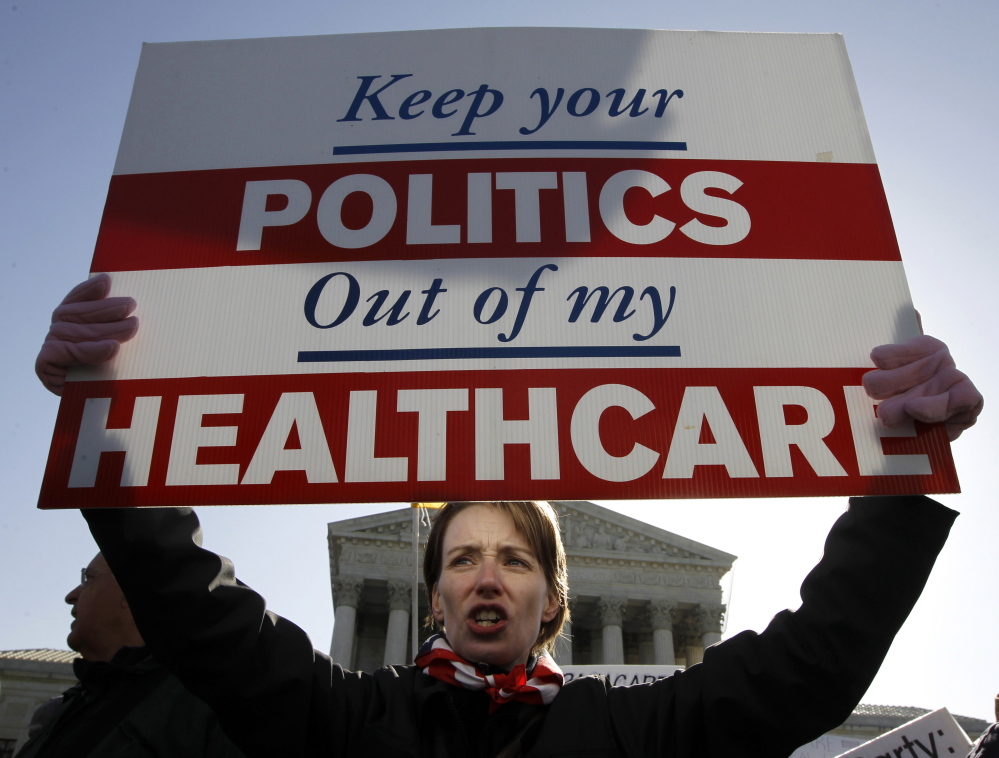WASHINGTON — Four little words will make a world of difference when the Supreme Court considers a potentially disabling challenge to President Obama’s signature health care law Wednesday.
In a case that concerns language and politics more than the Constitution, the ideologically divided court must divine the meaning of one crucial but arguably ambiguous phrase in the 906-page law. Its future, and insurance coverage for millions of people, might hang in the balance, for neither the first nor the last time.
“We will be seeing Affordable Care Act cases before the Supreme Court for decades to come,” predicted Jonathan H. Adler, a Case Western Reserve University School of Law professor who’s a leading critic of the law.
The oral argument Wednesday morning in King v. Burwell marks the latest return of the Affordable Care Act to the Supreme Court since 2012. Then, in a 5-4 decision authored by Chief Justice John Roberts Jr., the court upheld the law’s “individual mandate” requiring people to buy health insurance or pay a penalty.
This time, too, Roberts might play an important swing role, as the self-appointed protector of the court’s reputation.
And, as in 2012, the case has drawn an unusual number of kibitzers. Twenty-one amicus – friend of the court – briefs, some more trenchant than others, were filed supporting the challengers, and 31 defending the Obama administration’s actions.
FOUR WEIGHTED WORDS
The Supreme Court’s task this time is different from that in 2012 or in 2014, when a 5-4 majority ruled corporations could claim a religious exemption from a mandate to provide contraceptive coverage. Now, instead of determining whether Congress exceeded its constitutional authority in writing the health care law, the nine justices must interpret the statute’s meaning.
Under the health care law, states are encouraged, but not required, to establish exchanges to offer one-stop shopping for insurance coverage. Obama has likened the exchanges to an online site such as Amazon, a place where consumers can compare plans.
As inducement, the law offers tax credits to those qualified by income who buy insurance through an exchange “established by the State.” The challenge turns on this phrase.
Driven primarily by Republican resistance, several dozen states declined to establish health insurance exchanges. Nevertheless, the Internal Revenue Service has extended tax-credit subsidies to residents in these states who buy insurance through the federal exchange, HealthCare.gov.
“More than 5 million of the people who obtained coverage through exchanges in 2014 lived in one of the 34 states with an exchange operated by the federal government,” the legal team headed by U.S. Solicitor General Donald Verrilli Jr. said in a Jan. 21 brief, “and the overwhelming majority of these people relied on tax credits to pay their premiums each month.”
The remaining states – including California, Kentucky, Idaho and Washington – as well as the District of Columbia have established their own exchanges.
The tax-credit subsidies, moreover, are an essential part of the health care law’s insurance requirements. Congress, Verrilli noted, “cannot mandate people having something they can’t afford.”
The challengers to the law have essentially flipped this argument on its head. They say an unwanted and illegitimate subsidy moves them, against their will, under the Affordable Care Act’s discipline.
“By expanding subsidies,” conservative attorney Michael Carvin, the lead counsel for the plaintiffs, argued in a brief, “the IRS rule triggers (Affordable Care Act) mandates and penalties for millions of individuals and thousands of employers in states served by HealthCare.gov.”
As often happens in big Supreme Court cases, the named individuals in the underlying lawsuit were essentially enlisted for the task. Their job is to meet all legal requirements and to present a sympathetic face.
David King, the first-named plaintiff in the health care case, is a Virginia resident and Vietnam veteran. Usually, his plaintiff’s obligation would be done once the legal rocket has launched; King’s name, for instance, appears only once in his side’s 57-page lead brief.
Reports by The Wall Street Journal and other news organizations have raised questions, though, about whether King and the other plaintiffs have truly suffered injuries that create the legal standing necessary to file a lawsuit. King, for instance, is eligible for veterans’ health care.
Even if two or three of the named plaintiffs fall off the case, only one is needed for standing. If this is established, the court can reach the underlying argument.
Here, challengers say the law’s black-and-white text is crystal clear: A health exchange must be established by “the state” for tax-credit subsidies to be available. The federal government, by this reasoning, cannot simply step in when states have declined to act.
“What’s really crucial is what does the law itself say, because that’s the law that binds all of us,” said Carrie Severino, a former clerk to Justice Clarence Thomas who’s now chief counsel of the conservative Judicial Crisis Network. “We have to be able to refer to some objective law out there.”
Thomas and Justice Antonin Scalia pay strict attention to text.
DISPUTED DEFINITIONS
Supporters of the law counter that the questionable phrase cannot be understood in isolation. Instead, citing everything from the expectations of states to the deal-making that shaped the legislation, they insist on a broader interpretation.
“Focusing on isolated phrases divorced from textual cross-references, definitions and context, and with no regard for the statute’s structure and design, does not respect the rule of law,” Verrilli wrote.
The administration’s argument appeals to justices such as Elena Kagan, Obama’s former solicitor general. In an unrelated recent case involving a Florida fisherman, Kagan all but foreshadowed the reasoning that the Affordable Care Act’s supporters will adopt in defending the law.
“We do not construe the meaning of statutory terms in a vacuum,” Kagan wrote, adding that sometimes “the dictionary definition of a disputed term cannot control” the outcome.
Send questions/comments to the editors.



Comments are no longer available on this story